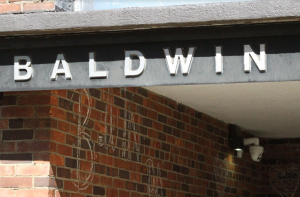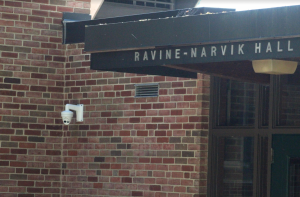Security cameras installed on campus despite student concerns

Trigger warning: Sexual assault, gun violence
The college installed security cameras on campus over the summer following the violent sexual assault in Ravine-Narvik Hall in December 2019.
“I was not aware (that cameras were installed) until I saw the news article and story from the Campus Instagram,” Andre Cabrera, ’21, said. “Honestly, (the installation of security cameras) surprised me. I was not even aware that they were considering it. The last time I even thought about security cameras on campus was last semester and that has been a while so (installing cameras) ‘under the table’ without saying anything, at least to my concern, was disappointing.”

The campus community has yet to receive an official email from the college acknowledging the initial installation in July.
“We had a consultant come and meet with us to talk about physical safety on campus and give us recommendations for physical safety improvements in January and February,” said Vice President of Student Life & Dean of Students April Thompson. “One of the improvement recommendations was to have more safety monitoring systems, particularly around the residence halls … Our emphasis is on our residence halls and the two pilot projects (with cameras) at Baldwin and Ravine are the launch of what we hope will be more cameras and safety systems outside of our residence halls.”
According to Thompson, security cameras were installed on the exterior doors of two residence halls, Ravine-Narvik Hall and Baldwin Hall. Cameras were also installed in parking lots as well as in areas where sensitive lab equipment is stored.
“We have a committee of students, faculty and staff known as the Campus Life and Community Standards committee, which has student representatives from ASG as well as the faculty so the feedback and process of getting input for the next phase will go through that committee as part of their regular business,” Thompson said. “I believe it will be later this semester that we try to work with the students to get input and then make decisions about future cameras and policies around cameras, including monitoring cameras.”
Students will receive an official notification from the college if additional cameras will be installed on campus, Thompson indicated.
Last semester, students expressed concerns regarding the potential for racial discrimination and profiling when reviewing the footage during investigations.
“(Discussions about security cameras) had mixed responses, but a lot of students were against cameras because (students) thought it was a huge invasion of privacy, which I also agree with,” former Class of 2022 President Kathryn Phillippe, ’22, said. “(Security cameras) also give way to a lot of racial discrimination and profiling.”
The college intends to collaborate with students to create policies and protocols that will prevent racial bias, Thompson said.
“We would like to involve students and others in conversations about where we go next and how to make sure that the monitor system and follow up actually address (how to prevent racial bias),” Thompson said.
Students are required to wear a mask at all times while on campus, according to new safety protocols put in place by the college. Students raised concerns about the potential of Public Safety not being able to use the cameras to identify people and questioned how the department expects to identify students, whom they may never have met.
“With everyone wearing masks, identifying someone off of a camera will be more difficult than ever so there is a lot of room for misidentification and rumors could spread,” Cabrera said. “I hope that (Public Safety) would not jump to conclusions regarding who did what.”
Last semester, students were vocal about their concerns of privacy invasion, especially if cameras are installed near the residence halls, to members of the Allegheny Student Government.
“(Video cameras will be placed by) exterior facing residence hall doors only,” clarified former ASG President Jason Ferrante, ’20, during the Feb. 4 general assembly. “They’re not going to be in your residence halls. They’re most certainly not going to be in your rooms. That’s a huge invasion of privacy.”
The college installed the security cameras on the exterior of the residence halls to prevent privacy concerns.
Some students believe that the installation of security cameras around the residence halls will increase student safety, especially in light of the December 2019 sexual assault.
“The cameras are not an invasion of privacy, they are a safety precaution because there is a lot of crime at the school and around the area,” Morgan Libell, ’23, said. “The catastrophic event that happened last year set people off — they were upset and scared. (Public Safety) is constantly busy filling work orders and responding to emergencies. (The officers) will not just sit in their offices watching security cameras and I know Public Safety has to do rounds and check every dorm building at least every hour… I really think that our privacy is going to be respected.”
Last year, Libell worked for the Physical Plant Department and had frequent interactions with Public Safety. She suggested any students who are concerned that their privacy is being violated should reach out to the college and express their concerns.
“I know that people are worried about an invasion of privacy and I think it is all right to protest (security cameras) being installed in the halls, but for places like the stairwells or even the main lobby, (cameras) will ensure that unwanted guests do not get in the dorm,” Libell added.
Libell resided in Baldwin Hall and recalled the large amounts of vandalism, including racial and homophobic slurs being written on the walls. She also recalled the frequent urination in the stairwells of Schultz Hall.
Other students believe that cameras could be an invasion of privacy.
“Crime will exist regardless of whether there is a camera in place,” Cabrera said. “One could argue that having cameras on campus could make us feel safer but I think the widespread consensus on campus from what I have heard from other students is that (the cameras) are an invasion of privacy — (the dorms) are where we live. I do not think that Allegheny really has a large enough campus to warrant constant surveillance of the residence halls. I think that there could be better decisions made that do not affect our mental well-being with (students) being able to feel private and not watched all of the time, especially with our dorms.”
Concerns also arose last semester about how the college intends to use the cameras. All discussions in February were hypothetical.
“If they are going to be installed regardless, we have to have a very specific policy that they are only used to protect students from violent attacks,” said former senator Quinn Broussard, ’22.
The college intends to use the cameras as an investigation technique for Public Safety instead of as an active policing measure, Thompson added. The college is also in the process of determining how long the footage will be stored by Public Safety and viable to use in an investigation.
“The camera footage can be used for investigatory purposes, but I will say that with a caveat that using (the cameras) for investigative purposes for things that compromise safety is their primary function,” Thompson said. “I can assure you that the college has no interest in following or tracking down every student who might be intoxicated. We do not have curfews and we want students to have the freedom to come and go.”
The cameras will be utilized at the college’s discretion if a student is visibly intoxicated and in need of medical assistance.
“(The college) will use (the camera footage) if something compromises health and safety of the community and of students — that is why we have (cameras),” Thompson clarified.
The college starts with an educational and health-based approach rather than immediate punishment to handle situations, such as alcohol poisoning. The college is more concerned with ensuring students receive medical attention if required as opposed to immediately punishing students who engage in these activities, Thompson said.
“At least if cameras were installed outside of the dorm halls or outside of the academic buildings, I would feel more safe,” Libell said. “I know that (the college) has taken a lot of precautions to ensure the safety of the students so the video cameras do not really make a difference for me, but if (the cameras) are going to help the college prevent an event like (the December sexual assault) from happening again the I am for them. No one ever wants (the sexual assault) to occur again.”
Libell alleged that several students attempted to break into her room while she and her roommate were present in the room last year. They contacted Public Safety, but officials were unable to identify the students, Libell added.
Other students believe security cameras are not required on the campus due to the relatively small size of the student body and campus.
“I, personally, do not think that (security cameras) are needed here,” Cabrera said. “Allegheny College really is not that large of a campus and if Allegheny believes that the Public Safety department can do a good enough job to keep us safe then I do not think that cameras are necessary. If anything, what they should focus on is fixing the basic infrastructure that was in place when that heinous crime happened last school year.”
The college has installed new security measures to increase student safety in residence halls and on campus, including new locks for doors, ID scanners, and peepholes.
Students questioned the purpose of security cameras when the college has a mandatory Statement of Community that all students are required to abide by.
“The Statement of Community only applies to our community,” Thompson said. “We are worried about not just our community, but also guests to our community, who students bring and outside people, who visit the campus.”
Security cameras are an industry standard for residential areas, including college campuses, Thompson added.
“The overwhelming response from every area was that (the college) needed cameras as much for outside members of our community as for inside members of our community,” Thompson added. “Students would feel safer and more secure knowing that these monitoring systems, for safety, were actually in place. We heard this loud and clear from student sessions, from families, from faculty and staff that our residence halls are such a critically important piece of our campus that we owe it to students, in particular, to make sure that we are monitoring them in all the ways that (the college) can to keep students safe.”

Sami Mirza is a senior from many different places. He is majoring in International Studies with a focus on the Middle East and North Africa and minor in...






